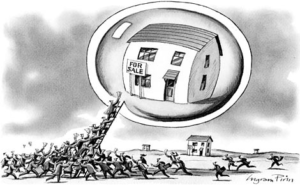Battle with the BBC

How one Positive Money Supporter Challenged The Mainstream Media and Won
One of the biggest obstacles we face in building a better money and banking system, is a lack of public understanding about how the system actually operates in the first place.
Economics textbooks are misleading and politicians often indulge in financial mythology, with their near constant comparisons of the government budget to that of a household. But nowhere is our fight for an accurate portrayal of the money system more of an uphill struggle than in the mainstream media.
Fortunately, thanks to one intrepid Positive Money supporter, we’re now one step closer to that goal.
Back in August 2018, David Laws, a consultant anaesthetist from Newcastle, was reading a BBC article on the Bank of England’s decision to raise interest rates when he spotted something wrong. The article stated:
“Older people tend to save more and in the future, that will provide a greater pool of savings for lending to households and industry and help prevent the economy from overheating.”
That is incorrect. Actually, it’s loans that create deposits – not the other way round.
The BBC’s original statement also contradicted the Bank of England’s very own explanation of the money system which we pushed them (the Bank of England) into clarifying in an early win back in 2014, that; “banks do not act simply as intermediaries” but instead “create money whenever they lend to someone in the economy or buy an asset from consumers”.
Unfortunately, since most of us don’t spend hours scrolling through the Bank of England’s website, this has yet to become common knowledge. And, given that only 15% of MPs know the truth about money creation, maybe the BBC thought they’d get away with it? How wrong they were. Dr Laws made a complaint straight away.

Dr David Laws (Positive Money media crusader!)
At first, the BBC dug in their heels and sent a formal dismissal reiterating the very misconception that Dr Laws had raised, claiming that:
“the pool of savings generated by older customers will help boost the supply of funds for lending by the banks, creating a downward pressure on rates.”
Unsatisfied by this failure to acknowledge their own mistake, Dr Laws made another complaint and it seemed like he was gaining ground when the BBC amended their original article to read:
“In its inflation report, the Bank said that an ageing population would hold relatively more assets, while lower productivity means reduced demand for capital from businesses. Combined, those two trends would lower the interest rate needed to stop the economy from overheating.”
But still there was no recognition of the fundamental point Dr Laws had raised – that commercial banks do not lend out savers’ deposits!
So this time, he wrote to the BBC’s Executive Complaints Unit, requesting that they not only acknowledge commercial banks as being credit creators, but offer reassurance that future BBC output would no longer inaccurately describe banks as financial intermediaries.
Months went by, until finally Dr Laws received a response from the Head of the BBC’s Executive Complaints Unit, Fraser Steel, who admitted that there had been “a serious breach” of BBC editorial standards:
“…we agree the original version of the article misrepresented the way modern banking works. As you have pointed out, it is not correct to imply banks act as financial intermediaries by simply lending out the deposits which savers place with them.”
Victory!
And that wasn’t all, as Steel went on to add:
“I share your concern that the BBC should accurately reflect the way modern banking works…a number of senior BBC News managers have been made aware of your complaint and our finding and I hope this will help to ensure journalists and editors are properly briefed and informed on this issue.”
In other words, as a result of Dr Laws’ complaint, senior BBC News managers have finally learnt how the money and banking system actually works – a huge win!
Smashing this misconception — that banks simply act as middlemen — is not just a theoretical matter, but one which is vital if we’re ever to achieve our vision of a fairer money and banking system, because falsehoods like this have dangerous real life consequences.
Take the global financial crisis as an example. Rather than shrewdly lending out people’s savings, in the run-up to 2008 banks were creating new money and, since they weren’t constrained by the existing money stock, they fuelled a housing bubble which burst.

As former chairman of the UK’s Financial Services Authority Lord Adair Turner puts it, the crisis occurred “because we failed to constrain the financial system’s creation of private credit and money.” And our collective failure to truly understand money continues to inflict harm to this day.
It’s under this erroneous sense that banks act as intermediaries, and thus require savings to fund investment, that policymakers and commentators preach the politics of austerity. Once you understand the basis of our monetary system you soon realise how ridiculous this proposition is. In fact, if everyone saved and paid down their debts, the amount of money in our economy (the money supply, in economists’ terms) would actually shrink and we’d be faced with a depression.
The mainstream media’s influence on shaping popular understandings of the money and banking system is huge. It’s why this victory is so important and why, since joining Positive Money in 2017, working with news editors and reporters to educate them on how the monetary system really works, has been one of the most fulfilling parts of my role. Dr Laws took a great initiative last August. Whilst it took over eight months for them to publish the final outcome — and sadly he was not the first Positive Money supporter who has had to correct the BBC — it is still a positive development.
The BBC is Britain’s flagship media outlet, and therefore improving the BBC’s reporting of financial articles is a hugely important step in reforming our monetary system. We’ll continue to work with journalists on accurately depicting the true workings of our money and banking system, until battles like Dr Laws’ become things of the past.